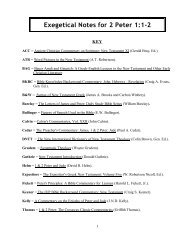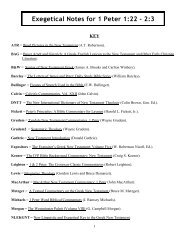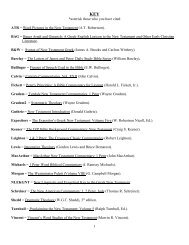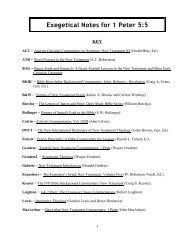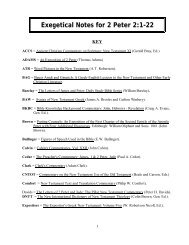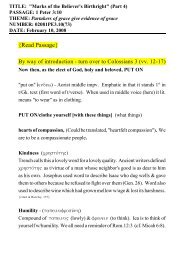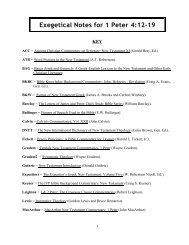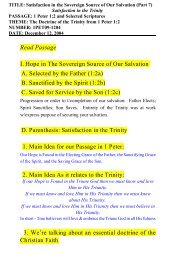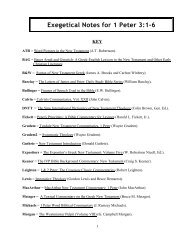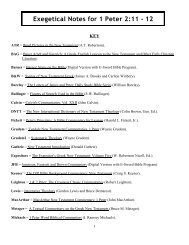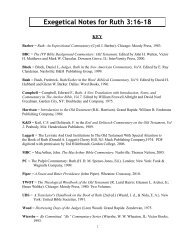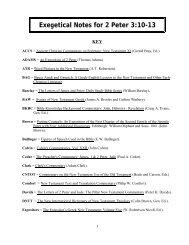Exegetical Notes for 1 Peter 5:6-11 - Tony Bartolucci
Exegetical Notes for 1 Peter 5:6-11 - Tony Bartolucci
Exegetical Notes for 1 Peter 5:6-11 - Tony Bartolucci
You also want an ePaper? Increase the reach of your titles
YUMPU automatically turns print PDFs into web optimized ePapers that Google loves.
������������������|| Noun: Masculine Genitive Singular). Genitive of Possession. Cf. "hand of God"<br />
in Exo. 3:19; 20:33, etc.<br />
God's absolute sovereignty and dominion (cf. v. <strong>11</strong>). This phrase often used in the OT - esp. of God's<br />
delivering his people from Egypt, Exo. 13:9; Deut. 3:24, 26:8, . The same power that delivered the Jews<br />
from Egyptian slavery is available to us to deliver us from the slavery of fear, pride, doubt.<br />
God's hand also signifies discipline (Exo. 3:20; Job 30:21; Psa. 32:4). This discipline would be in<br />
keeping with 4:17. We must humble ourselves under his hand of discipline and in keeping w/His sov.<br />
will.<br />
You cannot strive against God's sovereign will. All things bow to Him and Him alone. He does as He<br />
pleases.<br />
Cf. Nebuchadnezzar in Daniel 4.<br />
The kind of humility that bows to God's sovereignty is also the only way that we can ultimately be<br />
delivered from our affliction.<br />
so that He may lift you up in time: (���������������� ��� �������)<br />
���� ������ (�� = you || Second Person Independent Personal Pronoun: Accusative Plural).<br />
������������= to lift up, exalt || Verb: Third Person Singular Aorist Active Subjunctive). Subjunctive<br />
of Result. Cf. Luke 14:<strong>11</strong>; Phil. 2:9.<br />
�������������������= time, season || Noun: Masculine Dative Singular). Dative/Locative of Time. Same<br />
phrase used in Matt. 24:45.<br />
Note MacArthur doesn't believe this to be an eschatological term. However, see Kelly (page 208):<br />
". . . and this will be brought about at the appointed time. This expression paraphrases the<br />
enigmatic en kairoi (lit. 'in time'), which in classical Greek can mean (e.g. Thucydides, Hist. iv.<br />
59; vi. 9) 'at the opportune time' or (e.g. ib. i. 121) 'in our good time'). But in the N.T. ho kairos<br />
acquires eschatological overtones, meaning 'the time of crisis', 'the last time', 'the time of the End'<br />
(e.g. Mt. viii. 29; Mk. xiii. 33; Lk. xxi. 8; i Cor. iv. 5). This is clearly its <strong>for</strong>ce here; it is equivalent<br />
to 'in the last time' (en kairoi eschatoi) of i. 5, i.e. the time of the Parousia, and indeed in some<br />
MSS it is glossed by the insertion (after ii. 12) of 'of visitation' (episkopes)."<br />
"Exaltation to Come. Chrysostom: "<strong>Peter</strong> says that this will happen in due time, because he is<br />
teaching them that they will have to wait until the next life <strong>for</strong> this exaltation." [Catena]<br />
"The early apocryphal manuscript known as The Acts of <strong>Peter</strong> was the first to purport that the<br />
apostle's death came by inverted crucifixion. By the close of the second century Tertullian held<br />
the same view, and, in agreement, Origen is recorded as saying, '<strong>Peter</strong> was crucified at Rome with<br />
his d downwards, as he had desired to suffer.' Later Saint Jerome set his approval on this view,<br />
12



